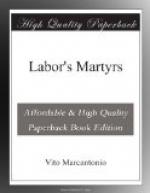The trial lasted 63 days. The jury was out only three hours. That’s all the time they needed to examine the mountain of evidence presented in those months. It is true that most of it was perjured, framed-up evidence prepared by the prosecution, wild-eyed stories of the men leaping from the wagon which was really a barricade, flaming pistols aimed at the police, etc. The rest was quotations from their writings and speeches made years before the Haymarket meeting was ever dreamed of. The verdict was a foregone conclusion: death for all but Oscar Neebe and for him 15 years in the penitentiary.
The judge thanked the jury from the bench and announced that there were carriages outside the door waiting to take them home. The press of the entire nation congratulated Chicago upon having such upright and courageous citizens to serve on juries. Chicago papers collected a purse of $100,000 to divide among them as a reward for work well done.
The case was appealed to the Illinois State Supreme Court which, on March 18, 1887, found no errors on which it could reverse the verdict. This despite affidavits proving that the jury was chosen from a carefully selected panel of enemies of the men by the bailiff and the judge and many other flagrant violations of civil rights, too many to enumerate.
And then came the appeal to the United States Supreme Court. Old as they are, none of the present incumbents were then sitting on the bench. But their worthy forerunners were equally reactionary. They found no constitutional grounds for reversal! Of course not, even though the right of free speech and assembly had been trampled underfoot at the Haymarket Square, the right to a fair trial made into a cruel farce.
On November 11, 1887, Albert Parsons, August Spies, Adolph Fischer and George Engel were led out to the gallows. At the last moment, yielding to the terrific pressure of protest which had been developed by the defense in the last months, and a great wave of general sympathy with the men throughout the country, Governor Oglesby commuted the sentences of Fielden and Schwab to life imprisonment. Two days before the execution—when the defense committee had mobilized a great movement in Chicago—tables for signing petitions to the governor had been set up in the city streets, the able police of Chicago, worthy ancestors of those police who murdered eleven steel strikers at the Republic plant on Memorial Day, 1937, suddenly discovered a bunch of “bombs” in the jail where the men were held. On the next day they announced that Louis Lingg had committed suicide by blowing his own head off with a small bomb!
Hitler used the Reichstag fire. Chicago used “bombs.”
The men died bravely, like the heroes that they were. Spies’ last words spoken on the gallows were prophetic: “The day will come when our silence will be more powerful than the voices you are throttling today.”




